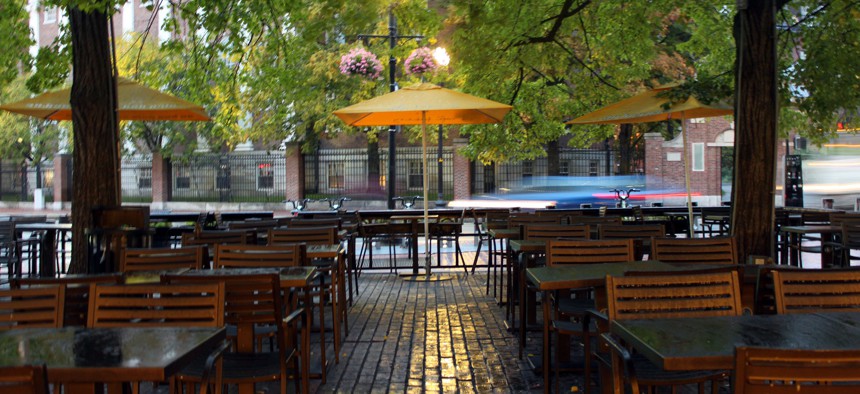One City Is Paying Restaurants to Make Meals for Homeless Shelters

Restaurants in Harvard Square are preparing meals for local homeless shelters during the Covid-19 pandemic. Flickr
The initiative in Cambridge, Massachusetts serves two purposes: ensuring homeless people have meals and keeping local restaurants afloat during the pandemic.
Two struggling populations in Cambridge, Massachusetts are now united in a unique city-led initiative to support each other during the coronavirus pandemic. Restaurant owners that can’t open up to the public are now preparing meals for local homeless shelters that can no longer use volunteers to cook meals.
The City of Cambridge committed to paying local restaurants to provide bagged or boxed meals for lunch and dinner at shelters, pledging to keep up the effort as long as social distancing requirements discourage volunteers from helping out. Volunteers aren’t considered essential workers, leaving many shelters running on a shoestring staff.
In its first week of operation, which started March 23, the program distributed 1,800 meals to eight homeless shelters and meal programs. Eight restaurants participated in the initial run, most of which were centrally located to make delivery easy.
“By contracting with local restaurants in Central and Harvard Square, where a large majority of homeless programs are located, we are able to minimize delivery challenges, and facilitate the availability of both hot and cold meals to shelters and other sites in both Squares,” said Mayor Sumbul Siddiqui and City Manager Louis DePasquale in a joint statement.
The city worked with local industry groups like the Harvard Square Business Association to recruit restaurants. Denise Jillson, the HBSA’s executive director, said that the association has an “incredibly robust infrastructure” that allowed them to pull the program together quickly. The city first reached out to the HSBA on March 19th, and two days later, there was a queue of restaurants in line to help. “There was no safety net, so we mobilized one,” she said. “This couldn’t have been a more positive and heartwarming response, and to know the city is committed to doing it until the crisis is over is a huge relief.”
The HBSA is now working to parse out city business among the roughly 30 restaurants and eateries around Harvard Square that are still open. “We’re hoping our businesses can hang on,” Jillson said. “They want to continue to cook good food and serve it to the public.”
Participating restaurants say that the city’s business has allowed them to stay afloat when fewer people are ordering takeout and delivery. “Programs like this help us weather the crisis and keep our staff paid while providing nourishment and comfort to the homeless community during this trying time,” said Erik Maas of Otto, a pizzeria. “We are looking forward to continuing our participation in this wonderful program.”
Shelter leaders say they are grateful for the extra help, as they lost many volunteers when Harvard University sent home its students in early March. Y2Y, a youth homeless shelter entirely run by student volunteers, had some of the most trouble adjusting.
“It was a difficult transition for our staff to have to move out of dorms while also working to reshape shelter policies and operations in light of the pandemic,” said Sanjana Ramrajvel, a Harvard student and the finance and supplies director at Y2Y. “However, this program meant that food was one less piece we would have to worry about. Everything was quite seamless, from the initial communication to the actual deliveries each day, and we’re incredibly grateful to all of the people involved in making this possible."
Inspired by the program in Cambridge, a similar initiative popped up in Oakland County, Michigan this week—and in places like Detroit and Portland, chefs aren’t waiting for local governments to serve as the intermediaries, instead coordinating directly with homeless shelters. Jillson said that she hopes more communities will soon follow suit. “This program has allowed us to keep people employed and get food to the most vulnerable in our community,” she said. “It’s the best way to confront this crisis within a crisis.”
NEXT STORY: Fixing Backlogs: An Essential Skill for Leaders in a Crisis






